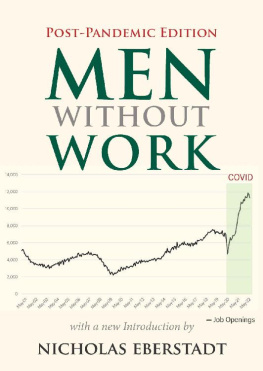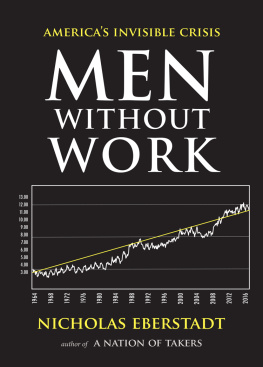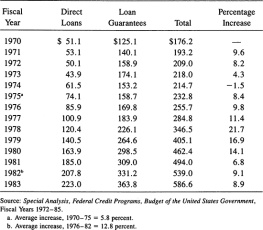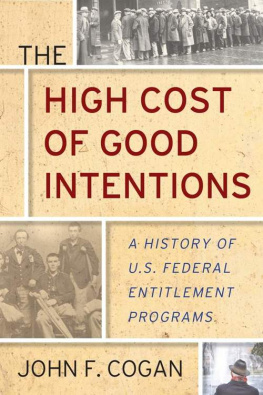A Nation of Takers
A N ATION OF T AKERS

Americas Entitlement Epidemic
Nicholas Eberstadt

Templeton Press
300 Conshohocken State Road, Suite 500
West Conshohocken, Pennsylvania, 19428
www.templetonpress.org
2012 Nicholas Eberstadt
All rights reserved.
No part of this book may be used or reproduced, stored in a retrieval system, or transmitted in any form or by any means, electronic, mechanical, photocopying, recording, or otherwise, without the written permission of Templeton Press.
Designed and typeset by Gopa & Ted2, Inc.
Visit www.templetonpress.org to access complete sources for figures.
ISBN-13 EBOOK: 978-1-59947-436-6
Library of Congress Cataloging-in-Publication Data on file
In memory of Daniel Patrick Moynihan
(19272003)

Contents

Acknowledgments

T HIS BOOK would not have come into being but for Susan Arellano of Templeton Press, whose idea it was that I write about the American entitlements question, and whose constant encouragement and sound guidance have made it much better than it would otherwise be. Ms. Kelly Matush provided exemplary research assistance over the course of this effort, as well as a keen eye to occasional lapses in my draft text. Ms. Jiyeon Song cheerfully offered expert help with some of the calculations and figures in this study, as well. Needless to say, I alone am responsible for any remaining errors. Gary Rosen of the Weekend Review for the Wall Street Journal did what every writer dreams his editor will do: He made my text sharper, more compelling, and more elegant in the excerpt he debuted in his pages. A special salute is due Sara Murray of the Wall Street Journal , who generously shared results from a Census Bureau analysis of entitlement program participation trends that had been commissioned by her paper. Conversations with Christopher C. DeMuth, long my boss at the American Enterprise Institute (AEI) and now Senior Fellow at the Hudson Institute, helped clarify my thoughts on several key questions. And it is Arthur C. Brooks, AEIs current president, who so far as I can tell first coined the phrase nation of takersin any case, he first introduced me to it. I hope he wont mind the way it is used in the pages that follow.
P ART I

Americas Growing Dependency
on Government Entitlements
Epigraph

The issue of welfare is the issue of dependency. It is different from poverty. To be poor is an objective condition; to be dependent, a subjective one as well. That the two circumstances interact is evident enough, and it is no secret that they are frequently combined. Yet a distinction must be made. Being poor is often combined with considerable personal qualities; being dependent rarely so. That is not to say that dependent people are not brave, resourceful, admirable but simply that their situation is never enviable, and rarely admired. It is an incomplete state of life: normal in a child, abnormal in an adult. In a world where completed men and women stand on their own feet, persons who are dependentas the buried imagery of the word denoteshang.
Daniel Patrick Moynihan, 1973
The Rise of Entitlements in
Modern America, 19602010

I NTRODUCTION
T HE A MERICAN REPUBLIC has endured for more than two and a quarter centuries; the United States is the worlds oldest constitutional democracy. But over the past fifty years, the apparatus of American governance has undergone a fundamental and radical transformation. In some basic respectsits scale, its preoccupations, even many of its purposesthe United States government today would be scarcely recognizable to a Franklin D. Roosevelt, much less an Abraham Lincoln or a Thomas Jefferson.
What is monumentally new about the American state today is the vast and colossal empire of entitlement payments that it protects, manages, and finances. Within living memory, the government of the United States of America has become an entitlements machine. As a day-to-day operation, the U.S. government devotes more attention and resources to the public transfers of money, goods, and services to individual citizens than to any other objective; and for the federal government, more to these ends than to all other purposes combined.
Government entitlement payments are benefits to which a person holds an established right under law (i.e., to which a person is entitled). A defining feature of these payments (also sometimes officially referred to as current transfer receipts of individuals from government, or simply transfers) is that they are benefits received for which no current service is performed.
The breathtaking growth of entitlement payments over the past half-century is shown in
These long-term spending trends mask shorter-run tendencies, to be sure. Over the past two decades, for example, the nominal growth in these entitlement outlays has slowed to an average of only 7.1 percent a year (or a doubling every decade). Adjusted for inflation by the Consumer Price Index, real entitlement outlays rose by an average of just 4.4 percent over those yearsand by a mere 3.2 percent a year on a per capita basis. But if the pace of entitlement growth has slowed in recent decades, so has the growth in per capita income. From 1960 to 2010 real per capita income in America grew by a measured 2.2 percent on averagebut over the past twenty years, it has increased by 1.6 percent per annum.
The magnitude of entitlement outlays today is staggering. In 2010 alone, government at all levels oversaw a transfer of over $2.2 trillion in money, goods, and services to recipient men, women, and children in the United States. At prevailing official exchange rates, that would have been greater than the entire GDP of Italy, roughly the equivalent of Britains and close to the total for Franceadvanced economies all with populations of roughly 60 million each.
A half-century of unfettered expansion of entitlement outlays has completely inverted the priorities, structure, and functions of federal administration, as these had been understood by all previous generations of American citizens. Until 1960 the accepted purpose of the federal government, in keeping with its constitutional charge, was governing. The federal governments spending patterns reflected that mandate. The overwhelming share of federal expenditures was allocated to defending the republic against enemies foreign and domestic (defense, justice, interest payments on the national debt) and some limited public services and infrastructural investments (the postal authority, agricultural extension, transport infrastructure, and the like). Historically, transfer payments did not figure prominently (or, sometimes, at all) in our federal ledgers. The Bureau of Economic Analysis (BEA), which prepares Americas GNP estimates and related national accounts, identifies only two calendar years before 1960 in which federal transfer payments exceeded other federal expenditures: in 1931, with President Herbert Hoovers heretofore unprecedented public relief programs, and in 1935, under President Roosevelt. (Even then, given the limited size of the U.S. government in those years, these entitlement transfers were negligible from a contemporary perspectivetotaling just over 3 percent of GDP in 1931, and under 3 percent in 1935.
Next page




















